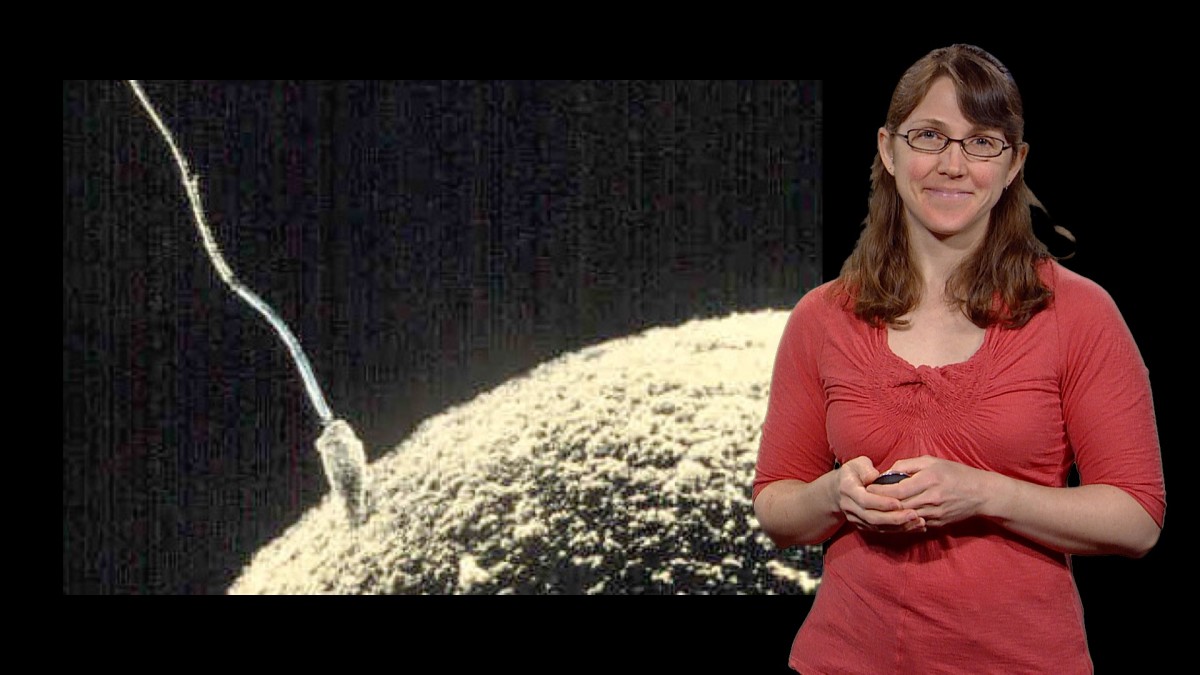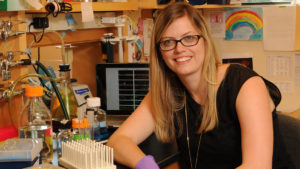
By Anna Hatch
For many, public speaking can be intimidating. Not for Jayme Dyer. For this postdoctoral fellow at the Department of Biology at MIT, standing in front of an audience to share her research has always been an energizing and empowering experience.
Five minutes into a conversation with Dyer two things are clear; first, she is passionate about science communication, and, second, she is really good at it. While she cannot pinpoint the exact moment she became hooked on science communication, she says it likely happened after she had given a talk and received helpful feedback from the audience.
“When you give a good talk, the audience can understand your research. And when they understand, they ask questions that can push your project forward,” Dyer states. In other words, the quality of your talk shapes the scientific feedback you receive. Giving a good, effective talk can help make your science better.
Practice makes perfect
When asked how she developed her speaking skills, Dyer said it’s from giving talks—lots of talks. She actively seeks out opportunities to get in front of an audience and present her research both at her institution (first Duke and now MIT) and at scientific conferences like the ASCB Annual Meeting.
Last year, because of her scientific merit, communication skills, and passion for science communication, Dyer was selected a winner of the 2015 Young Scientist Series (YSS) competition., YSS is a video series that features young researchers—at the graduate and postdoctoral level—giving talks about their discoveries. The series is created by iBiology, the science education nonprofit that produces a variety of free videos about biology research and other topics. iBiology videos often feature the scientists themselves talking about their work, telling stories, or sharing opinions.
Before recording her YSS video, Dyer and four other winners attended a multi-day workshop led by the Alan Alda Center for Communicating Science at Stony Brook University. The Alda Center is a leading organization that trains scientists to communicate more effectively. Through improv exercises and individual coaching, the young scientists learned how to connect with an audience and make their research more relatable and understandable to a wider audience. They applied what they learned into their 30-minute presentations, which they recorded the following day in a green screen studio. As with all iBiology videos, the YSS talks are freely available online and can be widely viewed by an international audience of students, scientists, educators, and the public.
The YSS experience helped Dyer hone her presentation skills and be more comfortable on stage.
Hooking your audience
“In order to leave the audience with lasting information”, Dyer said, “You want to attach new pieces of information to the knowledge they already have.” She describes how, like Velcro, the new information “sticks” to the old information.
For this approach to be effective, Dyer emphasizes that a big job of the speaker is to gauge the knowledge of the audience beforehand. A good introduction has the ability to distinguish a good talk from a great one, because it provides both the groundwork and context that the audience needs to understand your work. Because each audience is different, deciding how much and what type of background information to share is essential.
During her YSS training, Dyer recognized less could actually be more, especially on a PowerPoint slide. Audiences can easily lose focus when slides are cluttered with either too much data or too much text, so now Dyer strives to make one point per slide. Dyer also recommends using analogies to help different concepts stick—a strategy she says is especially useful when sharing a foreign concept or presenting to a broad audience.
For example, in her iBiology talk, Dyer likens smelling chocolate chip cookies baking in the oven to the way yeast cells sense a pheromone gradient during mating. Her graduate work in Daniel Lew’s lab at Duke University had discovered how a dynamic patch of proteins, residing just beneath the yeast cell membrane, are able to detect the highest concentration of pheromone and steer the cell to grow in that direction. The concept of how mating yeast cells sense and grow up a pheromone gradient to find a mating pair is pretty complex, but by drawing a parallel with smelling cookies she helps her audience connect with the idea.
Getting empowered
As a speaker, Dyer has been inspired by exceptional presentations that grab and keep the attention of the audience. After listening to presentations by Bonnie Bassler (Princeton) and Orna Cohen-Fix (NIH), Dyer realized she wanted to be just as engaging as these female investigators on stage.
“It’s hard to imagine being a successful woman scientist because most of our role models are men.” When women like Dyer, Bassler or Cohen-Fix give a talk, they have an opportunity to inspire fellow researchers, including the female trainees sitting in the audience. Not every young female scientist has the opportunity to interact with senior female scientists on a regular basis, so by being effective communicators, women scientists can act as role models. By presenting their research, attending seminars, asking questions, they lead—and empower others—by example.
To drive this point home, Dyer concludes with an anecdote from the 2012 Cell Polarity mini-symposium at ASCB. As she powered down her laptop once her presentation concluded, something stopped Dyer. She noticed a new email notification. A prominent female scientist in the audience had already sent her a message congratulating her on a talk well done.
“Having people tell me how much they enjoyed my talk is so nice to hear,” she shares. Getting this type of feedback can be a big confidence boost for young researchers, particularly women. A boost that leaves Dyer with the feeling of “Yes, I can do this! I can be a scientist.”
[su_divider top=”no” divider_color=”#eee” size=”2″ margin=”40″]





Leave a Reply